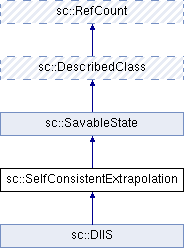The SelfConsistentExtrapolation abstract class is used to iteratively solve equations requiring a self consistent solution, such as,. More...
#include <math/optimize/scextrap.h>

Public Member Functions | |
| SelfConsistentExtrapolation (StateIn &) | |
| SelfConsistentExtrapolation (const Ref< KeyVal > &) | |
The only keyword read is tolerance, which is usually not needed since the objects using SelfConsistentExtrapolation should set the tolerances as needed. More... | |
| void | save_data_state (StateOut &) |
| Save the base classes (with save_data_state) and the members in the same order that the StateIn CTOR initializes them. More... | |
| void | set_tolerance (double t) |
| double | tolerance () |
| double | error () |
| int | converged () |
| virtual int | extrapolate (const Ref< SCExtrapData > &data, const Ref< SCExtrapError > &error)=0 |
| virtual void | start_extrapolation () |
| virtual void | reinitialize (Ref< SCExtrapData > data=0)=0 |
| This must be called if the extrapolation object is to be used again. More... | |
 Public Member Functions inherited from sc::SavableState Public Member Functions inherited from sc::SavableState | |
| SavableState & | operator= (const SavableState &) |
| void | save_state (StateOut &) |
| Save the state of the object as specified by the StateOut object. More... | |
| void | save_object_state (StateOut &) |
| This can be used for saving state when the exact type of the object is known for both the save and the restore. More... | |
| virtual void | save_vbase_state (StateOut &) |
| Save the virtual bases for the object. More... | |
 Public Member Functions inherited from sc::DescribedClass Public Member Functions inherited from sc::DescribedClass | |
| DescribedClass (const DescribedClass &) | |
| DescribedClass & | operator= (const DescribedClass &) |
| ClassDesc * | class_desc () const MPQC__NOEXCEPT |
| This returns the unique pointer to the ClassDesc corresponding to the given type_info object. More... | |
| const char * | class_name () const |
| Return the name of the object's exact type. | |
| int | class_version () const |
| Return the version of the class. | |
| virtual void | print (std::ostream &=ExEnv::out0()) const |
| Print the object. | |
| Ref< DescribedClass > | ref () |
| Return this object wrapped up in a Ref smart pointer. More... | |
 Public Member Functions inherited from sc::RefCount Public Member Functions inherited from sc::RefCount | |
| size_t | identifier () const |
| Return the unique identifier for this object that can be compared for different objects of different types. More... | |
| int | lock_ptr () const |
| Lock this object. | |
| int | unlock_ptr () const |
| Unlock this object. | |
| void | use_locks (bool inVal) |
| start and stop using locks on this object | |
| refcount_t | nreference () const |
| Return the reference count. | |
| refcount_t | reference () |
| Increment the reference count and return the new count. | |
| refcount_t | dereference () |
| Decrement the reference count and return the new count. | |
| int | managed () const |
| void | unmanage () |
| Turn off the reference counting mechanism for this object. More... | |
Protected Member Functions | |
| void | set_error (double e) |
 Protected Member Functions inherited from sc::SavableState Protected Member Functions inherited from sc::SavableState | |
| SavableState (const SavableState &) | |
| SavableState (StateIn &) | |
| Each derived class StateIn CTOR handles the restore corresponding to calling save_object_state, save_vbase_state, and save_data_state listed above. More... | |
 Protected Member Functions inherited from sc::RefCount Protected Member Functions inherited from sc::RefCount | |
| RefCount (const RefCount &) | |
| RefCount & | operator= (const RefCount &) |
Additional Inherited Members | |
 Static Public Member Functions inherited from sc::SavableState Static Public Member Functions inherited from sc::SavableState | |
| static void | save_state (SavableState *s, StateOut &) |
| static SavableState * | restore_state (StateIn &si) |
| Restores objects saved with save_state. More... | |
| static SavableState * | key_restore_state (StateIn &si, const char *keyword) |
| Like restore_state, but keyword is used to override values while restoring. | |
| static SavableState * | dir_restore_state (StateIn &si, const char *objectname, const char *keyword=0) |
Detailed Description
The SelfConsistentExtrapolation abstract class is used to iteratively solve equations requiring a self consistent solution, such as,.
![\[ \bar{x}' = f(\bar{x}) \]](form_163.png)
Constructor & Destructor Documentation
◆ SelfConsistentExtrapolation()
The only keyword read is tolerance, which is usually not needed since the objects using SelfConsistentExtrapolation should set the tolerances as needed.
Member Function Documentation
◆ reinitialize()
|
pure virtual |
This must be called if the extrapolation object is to be used again.
It should also be called before the first use of the object, if initial data needs to be given to the algorithm. The data object will be copied.
Implemented in sc::DIIS.
◆ save_data_state()
|
virtual |
Save the base classes (with save_data_state) and the members in the same order that the StateIn CTOR initializes them.
This must be implemented by the derived class if the class has data.
Reimplemented from sc::SavableState.
The documentation for this class was generated from the following file:
- src/lib/math/optimize/scextrap.h